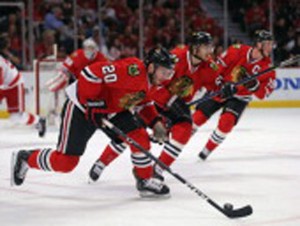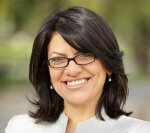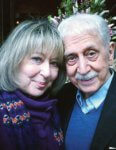When an American Arab was celebrated as contributing to the professional hockey Stanley Cup championship of the Chicago Blackhawks, you would think American Arabs would have recognized it as an opportunity to showcase their contributions to America. Other communities would be celebrating Saad, who happens to be a proud Syrian American of immigrant parents. Yet most in the American Arab community didn’t pay much attention
By Ray Hanania

There is a reason why people say “The Pen is Mightier than the Sword.” That’s because Strategic Communications is critical to the prosecution of a successful human rights campaign in Western countries, especially in the United States.
One of the fundamentals of successful strategic communications is often missed by American Arab activists whoa re consumed by the ongoing injustices committed by Israel against Palestinian civilians. That is the use of building on the ability to strengthen your connection to your “target audience” (Americans) by reinforcing similarities, sharing and mutual identification.
This week “Americans” of all nationalities, ethnicities and religions are celebrating the athletic achievements of the Chicago Blackhawks professional hockey team. Granted, it is not “soccer,” which is the most popular sport in the Middle East. But this isn’t the Middle East. We, Arabs, live right here in America.
So when we have a connection to something big that happens, we should engage in exploiting it in a positive way to reinforce positive public perceptions among mainstream Americans. We should be leading that discussion and effort through public engagement and education.

Instead, for the most part, American Arabs are sitting on the sidelines, in a self-imposed penalty box, watching with some pride that one of the winning Blackhawk team members is a very proud Syrian American, Brandon Saad.
Saad’s father, George, is from Syria. He immigrated to this country and is the quintessential icon of exactly what this country is all about. Not only did he build a successful life in this country, he raised an exceptionally talent son, who is proud of his Syrian Arab heritage, despite the increasing tendency of American Arabs to hide from their Arab heritage in the face of so much anti-Arab racism, bigotry and racism that dominate the American and Western landscapes.
It’s so easy for Arabs who are involved in mainstream professions, like the news media and business, to play down their Arab heritage and identity when presenting themselves to the American public. I know so many American Arab journalists who downplay their identity in a large part because it attracts a lot of controversy and criticism from mainstream racist haters.
I get attacked all the time every time I express my view on the Middle East. It is easier to avoid the attacks and criticism by avoiding boasting about your heritage. But I think that is wrong.
Brandon Saad’s involvement with the victory of the Blackhawks — this is their third Stanpy Cup playoff win in six years which is an unusual achievement in professional sports — is a rarity for American Arabs. We do have some American Arab athletes who have risen to the top in many fields, but not a lot when compared to other ethnic, religious or national immigrant groups.
So we should be standing up and shouting out from the rooftops about our pride in Brandon Saad both as an American athlete and as an American Arab athlete.
If I owned an Arab restaurant, always worried about why many non-Arab mainstream Americans don’t come in to enjoy a Middle East meal at my establishment (some do but many do not), I would see this as an opportunity to use strategic communications to open the doors to invite those who do not venture in to come in to the restaurant and try our food.
I’d hang up a huge sign celebrating the Blackhawks and the role of “Syrian American Blackhawks Star Brandon Saad” across the front of my restaurant bragging about his achievement and using it to connect to mainstream pride in the Blackhawks.
Millions of people came out for the celebratory parade on CHicago’s West Side on Thursday morning to celebrate the Blackhawks, and most were cheering Brandon Saad. Many TV anchors were noting Saad’s Syrian heritage and how he has pride in his ethnicity, and his father’s immigrant experience, an experience that is certainly reflective of the same experience of other Americans, almost all of whom are children or grandchildren or great grand children of immigrants from other countries.
It’s nuances like this that offer insight into why American Arabs have such a troubling history of trying to convince the mainstream American public of the righteousness of the Palestinian cause, for example, or why many Americans really don’t care about the brutality and massacres of civilians in Syria and only view the conflict there as a frontline against another Arab and Islamic-driven anti-American terrorist organization, Daesh (ISIS).
It is not what you say to the American public that has the greatest impact on what they believe. It is how you say it (not just language usage and proper English pronunciation and eloquence, but also how you appear and reflect the look and dress of the audience.)
The more you look and sound like the audience, the more effective your message will be. The more you look different than the audience you are addressing, the less the audience will identify and embrace your message and narrative. In fact, the less you look and sound like the audience you are speaking too, the more they will likely reject your message, irrespective of the facts.
That’s tough for Arabs to understand, coming from the Middle East, a region of the world that has been historically oppressed by dictatorships and influenced by foreign countries that both have imposed censorship and violent punishment, including death and execution, in response to free speech expressions.
That’s why Tahrir Square in Cairo was such a big deal, because public expression of criticism and free speech are so rare in the Middle East and rarely happen.
American Arabs especially need to understand professional communications. They don’t.
Just look at the professional “news wires” that distribute press releases for fees to the 10,000-plus American news media outlets like newspapers, radio stations and television stations. There are so few releases from American Arab organizations.
We need to do more.


- Israelisnipers shooting and killing hospital workers in Gaza - December 11, 2023
- CAIR Condemns Israeli Executions of Wounded, Unarmed Palestinian in West Bank - December 11, 2023
- Arab and Muslim American voters face a “simple choice” between Biden’s inhumanity and Trump’s edgy politics - December 9, 2023
























